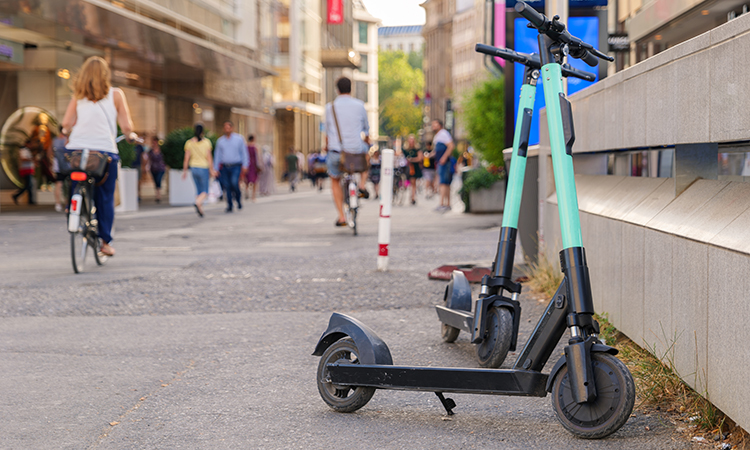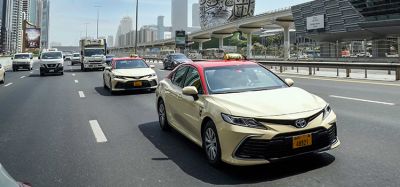AI e-scooter programme to begin in Dublin
- Like
- Digg
- Del
- Tumblr
- VKontakte
- Buffer
- Love This
- Odnoklassniki
- Meneame
- Blogger
- Amazon
- Yahoo Mail
- Gmail
- AOL
- Newsvine
- HackerNews
- Evernote
- MySpace
- Mail.ru
- Viadeo
- Line
- Comments
- Yummly
- SMS
- Viber
- Telegram
- Subscribe
- Skype
- Facebook Messenger
- Kakao
- LiveJournal
- Yammer
- Edgar
- Fintel
- Mix
- Instapaper
- Copy Link
Posted: 15 April 2021 | Intelligent Transport | No comments yet
The pilot is reportedly the first of its kind in Ireland, with the research team hoping to gather important real-world data to help shape future e-scooter roll outs.


A new AI-powered e-scooter research pilot project is to launch in Dublin City University (DCU), in parallel with moves to make scooters street legal across Ireland. The shared scooter pilot scheme, which will operate on DCU campuses (and between campuses once legislation allows), aims to set the bar for e-scooter safety standards in Ireland and worldwide.
The trial will involve the collaboration of four organisations, including e-scooter operator TIER, Irish micromobility tech platform Luna, the Insight SFI Research Centre For Data Analytics, and Smart DCU (a district of Smart Dublin).
Those behind the project say the pilot will also be Ireland’s first major structured e-scooter trial. The purpose of the research project is to simultaneously improve e-scooter safety and to explore the Smart City possibilities associated with computer vision equipped micromobility vehicles.
The collaboration will start immediately on individual DCU campuses, while the computer vision equipped TIER scooters will also be able to operate between the various campuses (and potentially other private sites across Dublin) as soon as Government legislation regulating electric scooter usage is signed into law.
As part of the project, TIER and Luna will provide a fleet of 30 computer vision-enabled scooters, allowing DCU-based Insight researchers to explore a new source of smart city data. Equipped with the Luna technology, the operator says the TIER scooters will be immediately capable of running pedestrian detection and lane segmentation algorithms, allowing the vehicles to understand how many people are in their path, as well as whether they are on the road, a cycle lane, or footpath.
The vision data generated by the fleet will be analysed by DCU-based Insight researchers, with a view to identifying smart city use cases and applications of value to local authorities, in line with the mission of Smart Dublin. It is envisaged that some of the use cases that could be prototyped during the pilot, include traffic congestion alerts, road condition monitoring, street infrastructure mapping, kerbside management applications, as well as heat mapping of footpath riding incidents as an indicator of problematic junctions or inadequate cycling infrastructure.
Separately, TIER and DCU say they will monitor the modal shift pattern from cars to scooters across DCU users, with a focus on reducing the University’s transport-related emissions. TIER will also explore the impact of its ‘Energy Network’ innovation in terms of driving footfall to local retail outlets as part of cities’ post-Covid economic recovery. TIER’s model allows users to swap depleted e-scooter batteries – in return for free travel – at charging stations hosted in local retail outlets. The operator says pilot data from the Energy Network in Finland reveals the average convenience store enjoys an average of €18,000 additional income as a result of TIER users entering to switch batteries.
“This is such an important research pilot project for TIER in Ireland and we look forward to mobilising the DCU fleet of e-scooters,” said Fred Jones, TIER General Manager for Northern Europe.
“This is an exciting opportunity for detailed research on smart city applications of scooters as well as modal shift, as we work with the University to reduce its carbon footprint and offer a more sustainable first and last mile public transport solution. We hope to apply all project learnings to future TIER operations in Ireland”.
“The confluence of e-mobility, smart cities, computer vision, AI and data analytics is a key area of interest to Insight researchers in DCU,” said Proffessor Noel O’Connor, CEO Insight SFI Research Centre for Data Analytics.
“The ‘Smart DCU’ platform in partnership with Smart Dublin, has created the perfect test bed where industry and academia can combine to come up with the solutions that will help enhance the future of safe micromobility. This in turn will drive its adoption globally, supporting societies shared climate goals.”
Related topics
Alternative Power, Business Models, Infrastructure & Urban Planning, On-Demand Transport, Passenger Experience, Sustainable Urban Transport, Transport Governance & Policy, Vehicle & Passenger Safety
Related modes
Bikes & Scooters
Related cities
Ireland
Related organisations
Dublin City University (DCU), Luna, TIER
Related people
Fred Jones, Noel O'Connor








